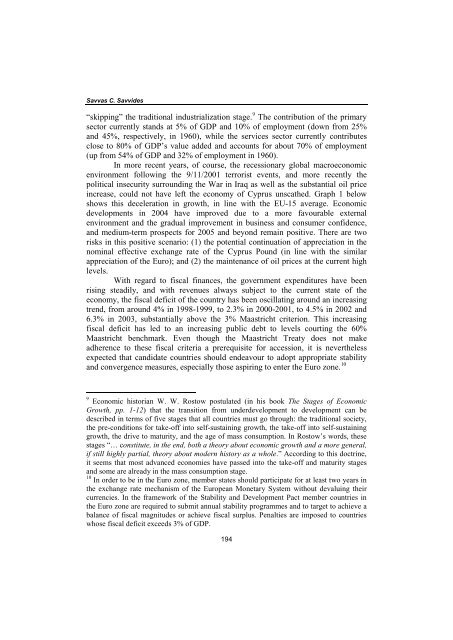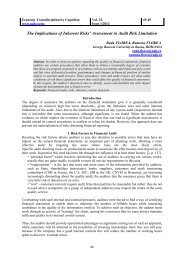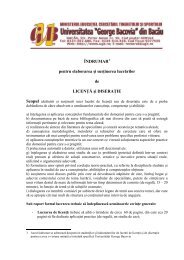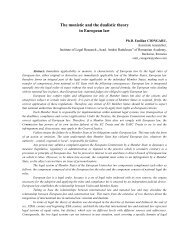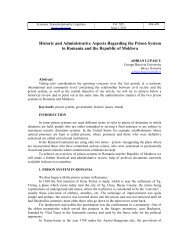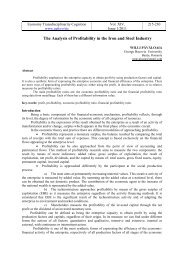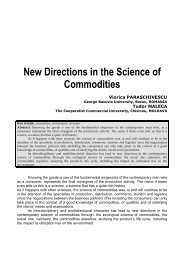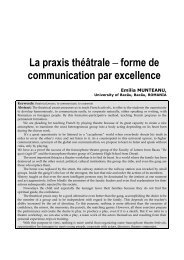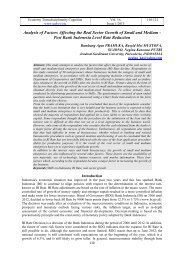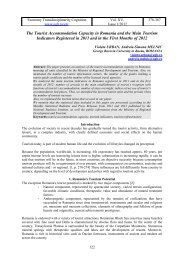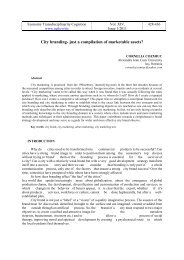- Page 1 and 2:
CUPRINSMANAGEMENT ŞIADMINISTRAŢIE
- Page 3 and 4:
INTEGRARE EUROPEANĂŞI MARKETING27
- Page 5:
MANAGEMENT ŞIADMINISTRAŢIE PUBLIC
- Page 8 and 9:
Mihaela Bîrsanse dau înţelesuri
- Page 10 and 11:
Mihaela BîrsanStandardul recomand
- Page 12 and 13:
Mihaela Bîrsan- încrederea confor
- Page 14 and 15:
Mihaela BîrsanCu cât valoarea ace
- Page 16 and 17:
Dumitru Bontaş, Violeta Urbandecur
- Page 18 and 19:
Dumitru Bontaş, Violeta Urbanadecv
- Page 20 and 21:
ASPECTE PRIVIND OPTIMIZAREAPROCESUL
- Page 22 and 23:
Aspecte privind optimizarea procesu
- Page 24 and 25:
Aspecte privind optimizarea procesu
- Page 26 and 27:
Aspecte privind optimizarea procesu
- Page 28 and 29:
RAPORTUL JURIDICDINTRE COMERCIANT
- Page 30 and 31:
Raportul juridic dintre comerciant
- Page 32 and 33:
Raportul juridic dintre comerciant
- Page 34 and 35:
ELEMENTE DE AUDIT STRATEGICAurel BR
- Page 36 and 37:
Elemente de audit strategicplăteas
- Page 38 and 39:
Elemente de audit strategiccompetit
- Page 40 and 41:
Elemente de audit strategic- Tipul
- Page 42 and 43:
FocalizareaConfruntarea-Să se vad
- Page 44 and 45:
TEHNICI DE SPRIJINIRE A DECIZIILORM
- Page 46 and 47:
Tehnici de sprijinire a deciziilor
- Page 48 and 49:
Tehnici de sprijinire a deciziilor
- Page 50 and 51:
Tehnici de sprijinire a deciziilor
- Page 52 and 53:
Tehnici de sprijinire a deciziilor
- Page 54 and 55:
Florin Mihai Căprioară, Alina Cor
- Page 56 and 57:
Florin Mihai Căprioară, Alina Cor
- Page 58 and 59:
Florin Mihai Căprioară, Alina Cor
- Page 60 and 61:
Florin Mihai Căprioară, Alina Cor
- Page 62 and 63:
Florin Mihai Căprioară, Alina Cor
- Page 64 and 65:
Florin Mihai Căprioară, Alina Cor
- Page 66 and 67:
Angelica Cobzarusemnificaţiilor un
- Page 68 and 69:
Angelica CobzaruPrevenirea presupun
- Page 70 and 71:
Angelica CobzaruÎn fapt, principiu
- Page 72 and 73:
Angelica Cobzarumodificate genetic,
- Page 74 and 75:
INTEGRAREA CUNOAŞTERII (ECONOMICUL
- Page 76 and 77:
Integrarea cunoaşterii (economicul
- Page 78 and 79:
Integrarea cunoaşterii (economicul
- Page 80 and 81:
FORMELE ORGANIZATORICO - JURIDICEAL
- Page 82 and 83:
Formele organizatorico - juridice a
- Page 84 and 85:
Formele organizatorico - juridice a
- Page 86 and 87:
Formele organizatorico - juridice a
- Page 88 and 89:
Formele organizatorico - juridice a
- Page 90 and 91:
Formele organizatorico - juridice a
- Page 92 and 93:
Adrian Gherasimacoperirea nevoii re
- Page 94 and 95:
Adrian Gherasimîn care:qn i1- prod
- Page 96 and 97:
Adrian Gherasimrelaţia:În ceea ce
- Page 98 and 99:
Adrian GherasimPotrivit unei metodo
- Page 100 and 101:
OBSERVAŢII CRITICE PRIVINDVALOAREA
- Page 102 and 103:
Observaţii critice privind valoare
- Page 104 and 105:
Observaţii critice privind valoare
- Page 106 and 107:
OPTIMIZAREA SISTEMATIZĂRII SERVICI
- Page 108 and 109:
Optimizarea sistematizării servici
- Page 110 and 111:
Optimizarea sistematizării servici
- Page 112 and 113:
Otilia LupuRepartiţia pe ani de st
- Page 114 and 115:
Otilia Lupucunosc jumătate din lis
- Page 116 and 117:
ENTREPRENEURSHIP IN EUROPE. WHAT AB
- Page 118 and 119:
Entrepreneurship In Europe. What Ab
- Page 120 and 121:
CONCEPTUALIZARE ŞI OPTIMIZARE ASTR
- Page 122 and 123:
Conceptualizare şi optimizare a st
- Page 124 and 125:
Conceptualizare şi optimizare a st
- Page 126 and 127:
„ACADEMIC SPIN-OFF” ET FORMATIO
- Page 128 and 129:
„Academic spin-off” et formatio
- Page 130 and 131: „Academic spin-off” et formatio
- Page 132 and 133: „Academic spin-off” et formatio
- Page 134 and 135: „Academic spin-off” et formatio
- Page 136 and 137: „Academic spin-off” et formatio
- Page 138 and 139: „Academic spin-off” et formatio
- Page 140 and 141: „Academic spin-off” et formatio
- Page 142 and 143: Andrei Octavian Paraschivescutransp
- Page 144 and 145: Andrei Octavian Paraschivescu- coru
- Page 146 and 147: PARTICULARITĂŢILE DEZVOLTĂRII CO
- Page 148 and 149: Particularităţile dezvoltării co
- Page 151 and 152: Angela Pănuţă, Viorica Zagaievsc
- Page 153 and 154: Gheorghe Popadrepturile omului, dre
- Page 155 and 156: Gheorghe Popainfracţiuni putând f
- Page 157 and 158: Gheorghe Popa2.4. Alte infracţiuni
- Page 159 and 160: CONSIDERAŢII PRIVIND DETERMINAREA
- Page 161 and 162: Consideraţii privind determinarea
- Page 163 and 164: T dConsideraţii privind determinar
- Page 165 and 166: Consideraţii privind determinarea
- Page 167 and 168: CONDIŢIILE DE VALABILITATE ALE ACT
- Page 169 and 170: Condiţiile de valabilitate ale act
- Page 171 and 172: Condiţiile de valabilitate ale act
- Page 173 and 174: Condiţiile de valabilitate ale act
- Page 175 and 176: Condiţiile de valabilitate ale act
- Page 177 and 178: Savvas C. Savvidesto the EEC in the
- Page 179: Savvas C. Savvidesrights; from vari
- Page 183 and 184: Savvas C. Savvidesbuild into their
- Page 185 and 186: Savvas C. Savvidessettled and harmo
- Page 187 and 188: Savvas C. Savvidesof some marginal
- Page 189 and 190: Savvas C. Savvidesprovide the 10 ca
- Page 191 and 192: Savvas C. SavvidesAccording to the
- Page 193 and 194: Savvas C. SavvidesProductivity grow
- Page 195 and 196: Savvas C. SavvidesThe current state
- Page 197 and 198: Savvas C. Savvidesin recent years h
- Page 199 and 200: Savvas C. Savvides4.2.6. Research a
- Page 201 and 202: Savvas C. Savvides5. PROSPECTS AND
- Page 203 and 204: Savvas C. Savvidesdevelopments have
- Page 205 and 206: Savvas C. Savvidesinstitutions, wri
- Page 207 and 208: Savvas C. SavvidesAppendix 1Inflati
- Page 209 and 210: Savvas C. SavvidesAppendix 3Major M
- Page 211 and 212: Savvas C. Savvidessystem alone requ
- Page 213 and 214: Savvas C. SavvidesAppendix 6Relatio
- Page 215 and 216: Savvas C. Savvides7. Beatson, Mark
- Page 217 and 218: Savvas C. Savvides40. Sachs, Jeffre
- Page 219 and 220: Tatiana Puiuactivitate, puterea de
- Page 221 and 222: Tatiana PuiuMediuleconomicMediul po
- Page 223 and 224: Tatiana Puiumanagement al întrepri
- Page 225 and 226: Tatiana PuiuElementele mediului amb
- Page 227 and 228: ASIGURAREA CALITĂŢII ÎNÎNVĂŢ
- Page 229 and 230: 243Asigurarea calităţii în înv
- Page 231 and 232:
245Asigurarea calităţii în înv
- Page 233 and 234:
247Asigurarea calităţii în înv
- Page 235 and 236:
Asigurarea calităţii în învăţ
- Page 237 and 238:
Asigurarea calităţii în învăţ
- Page 239 and 240:
253Asigurarea calităţii în înv
- Page 241 and 242:
Asigurarea calităţii în învăţ
- Page 243 and 244:
257Asigurarea calităţii în înv
- Page 245 and 246:
Asigurarea calităţii în învăţ
- Page 247 and 248:
Asigurarea calităţii în învăţ
- Page 249 and 250:
MANAGEMENTUL PROIECTELORÎN CREAŢI
- Page 251 and 252:
Managementul proiectelor în creaţ
- Page 253 and 254:
Managementul proiectelor în creaţ
- Page 255 and 256:
Managementul proiectelor în creaţ
- Page 257 and 258:
Managementul proiectelor în creaţ
- Page 259:
INTEGRARE EUROPEANĂŞI MARKETING
- Page 262 and 263:
Lucian Anton- marketingul este doar
- Page 264 and 265:
Lucian AntonPentru a determina pute
- Page 266 and 267:
Lucian Anton- modificarea calităţ
- Page 268 and 269:
Maria Gianina Beraruliber a benefic
- Page 270 and 271:
Maria Gianina Beraruliber nu poate
- Page 272 and 273:
Maria Gianina Berarugalben. Proiect
- Page 274 and 275:
Maria Gianina Beraruconformitate cu
- Page 276 and 277:
Claudia BobâlcăForme de utilizare
- Page 278 and 279:
Claudia Bobâlcăbrokerii de liste
- Page 280 and 281:
COMUNICAREA ÎN MASS MEDIA DINROMÂ
- Page 282 and 283:
Comunicarea în Mass media din Rom
- Page 284 and 285:
Comunicarea în Mass media din Rom
- Page 286 and 287:
Comunicarea în Mass media din Rom
- Page 288 and 289:
PRIORITĂŢI ÎN ALEGEREA FURNIZORI
- Page 290 and 291:
Priorităţi în alegerea furnizori
- Page 292 and 293:
INTEGRAREA ROMÂNIEI DIN PERSPECTIV
- Page 294 and 295:
Integrarea României din perspectiv
- Page 296 and 297:
Integrarea României din perspectiv
- Page 298 and 299:
Ramona Florea• “procesul prin c
- Page 300 and 301:
Ramona FloreaLa nivel macroeconomic
- Page 302 and 303:
Ramona Floreaeste persoana care cre
- Page 304 and 305:
Ramona Floreacompensărilor în pro
- Page 306 and 307:
Gabriela Fotache, Marian Fotacheîm
- Page 308 and 309:
Gabriela Fotache, Marian FotacheApr
- Page 310 and 311:
Gabriela Fotache, Marian Fotachefon
- Page 312 and 313:
Gabriela Fotache, Marian Fotache- P
- Page 314 and 315:
Toader GherasimAşadar, punctul de
- Page 316 and 317:
Toader Gherasimexecute paralel cu o
- Page 318 and 319:
Toader Gherasimdomeniu, cum ar fi:
- Page 320 and 321:
DEZVOLTAREA PROIECTELOR B2C(BUSINES
- Page 322 and 323:
Dezvoltarea proiectelor B2C (Busine
- Page 324 and 325:
Dezvoltarea proiectelor B2C (Busine
- Page 326 and 327:
Dezvoltarea proiectelor B2C (Busine
- Page 328 and 329:
TRATATUL DE LA MAASTRICHT - PASUL D
- Page 330 and 331:
Tratatul de la Maastricht - pasul d
- Page 332 and 333:
Tratatul de la Maastricht - pasul d
- Page 334 and 335:
Tratatul de la Maastricht - pasul d
- Page 336 and 337:
Tratatul de la Maastricht - pasul d
- Page 338 and 339:
Tratatul de la Maastricht - pasul d
- Page 340 and 341:
Tratatul de la Maastricht - pasul d
- Page 342 and 343:
Tratatul de la Maastricht - pasul d
- Page 344 and 345:
DOTAREA CU FACTORI DE PRODUCŢIECRI
- Page 346 and 347:
Dotarea cu factori de producţie -
- Page 348 and 349:
Dotarea cu factori de producţie -
- Page 350 and 351:
Dotarea cu factori de producţie -
- Page 352 and 353:
Dotarea cu factori de producţie -
- Page 354 and 355:
Gabriela Marchisîn care această a
- Page 356 and 357:
Gabriela Marchisreamplasarea activi
- Page 358 and 359:
Gabriela MarchisStudiile efectuate
- Page 360 and 361:
Simina Mastacanposibil pericol. 1 C
- Page 362 and 363:
Simina Mastacanorice limbă s-ar ex
- Page 364 and 365:
Simina MastacanCodul, ca instrument
- Page 366 and 367:
Simina Mastacancorespund acelor fr
- Page 368 and 369:
Simina Mastacansex feminin prin con
- Page 370 and 371:
Simina Mastacanexprimării, este ma
- Page 372 and 373:
Simina Mastacan10. Jestaz, Philippe
- Page 374 and 375:
Sorin MunteanuDate fiind aceste con
- Page 376 and 377:
Sorin MunteanuNumele lui Lyotard es
- Page 378 and 379:
Sorin Munteanuprima instanţă, la
- Page 380 and 381:
Sorin Munteanuinstanţă, i-am pute
- Page 382 and 383:
Sorin Munteanuintenţionat alterat
- Page 384 and 385:
Ştefan MunteanuPe de altă parte,
- Page 386 and 387:
Ştefan Munteanucă, pentru Toma d
- Page 388 and 389:
Ştefan MunteanuÎn secolele XIV-XV
- Page 390 and 391:
Ştefan Munteanucare suveranitatea
- Page 392 and 393:
Ştefan MunteanuBibliografie:1. Bog
- Page 394 and 395:
Viorica Paraschivescu, Violeta Urba
- Page 396 and 397:
Viorica Paraschivescu, Violeta Urba
- Page 398 and 399:
Viorica Paraschivescu, Violeta Urba
- Page 400 and 401:
E-LEARNING ÎN ŞTIINŢELE SOCIO-UM
- Page 402 and 403:
E-learning în ştiinţele socio-um
- Page 404 and 405:
E-learning în ştiinţele socio-um
- Page 406 and 407:
E-learning în ştiinţele socio-um
- Page 408 and 409:
E-learning în ştiinţele socio-um
- Page 410 and 411:
DEZVOLTAREA COMERŢULUI EN - GROS
- Page 412 and 413:
Dezvoltarea comerţului en - gros
- Page 414 and 415:
Dezvoltarea comerţului en - gros
- Page 416 and 417:
Dezvoltarea comerţului en - gros
- Page 418 and 419:
Dezvoltarea comerţului en - gros
- Page 420 and 421:
Natalia Raischi100%90%80%70%60%50%4
- Page 422 and 423:
Natalia Raischi4,7% faţă de anul
- Page 424 and 425:
CONTROLUL DE MARKETING ŞI AUDITUL
- Page 426 and 427:
Controlul de marketing şi auditul
- Page 428 and 429:
Controlul de marketing şi auditul
- Page 430 and 431:
LIBERALISMUL ECONOMIC ÎN ROMÂNIA
- Page 432 and 433:
Liberalismul economic în România
- Page 434 and 435:
Liberalismul economic în România
- Page 436 and 437:
MANIPULAREA CONSUMATORULUIPRIN PUBL
- Page 438 and 439:
459Manipularea consumatorului prin
- Page 440 and 441:
Manipularea consumatorului prin pub
- Page 442 and 443:
Parascovia Tocancomponentă a acest
- Page 444 and 445:
Parascovia Tocande succes înseamn
- Page 446 and 447:
Parascovia TocanÎn planul de acţi
- Page 448 and 449:
Parascovia TocanAnsamblul instrumen
- Page 450 and 451:
INTEGRATION OF THE REPUBLIC OF MOLD
- Page 452 and 453:
Integration of the Republic of Mold
- Page 454 and 455:
Integration of the Republic of Mold
- Page 456 and 457:
Integration of the Republic of Mold
- Page 458 and 459:
C ONTENTSMANAGEMENT ANDPUBLIC ADMIN
- Page 460 and 461:
EUROPEAN INTEGRATIONAND MARKETING27
- Page 462 and 463:
UNIVERSITATEA "GEORGE BACOVIA"BULET


